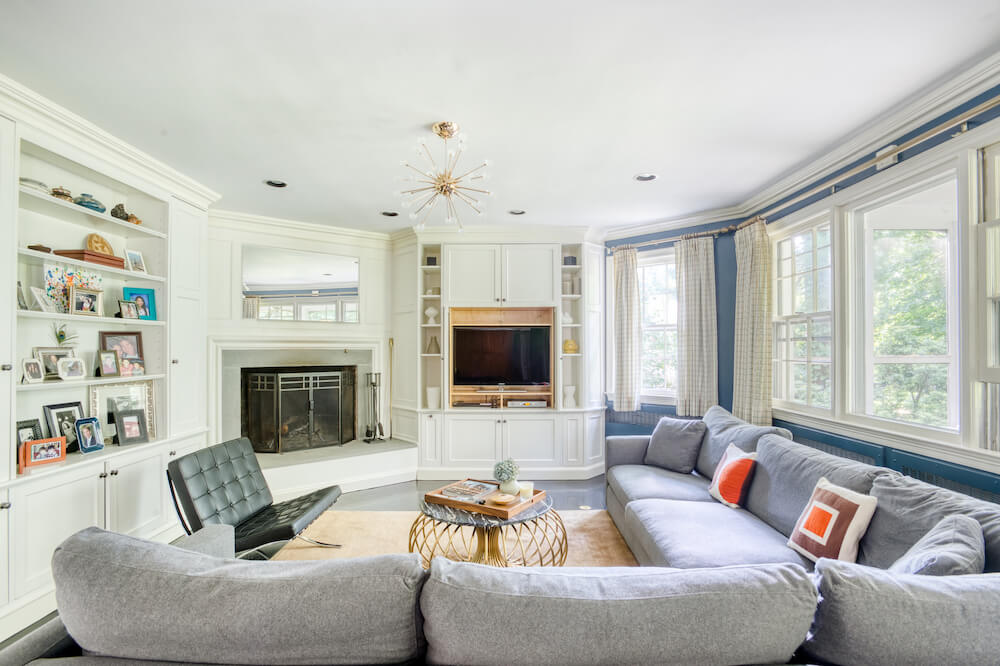Home Renovation Cost Tips: Home renovation can be exciting and daunting. Costs often spiral out of control.
Also Read
Planning your home renovation budget can save you stress and money. If you’re upgrading a room or a whole house, know the costs. A smart budget and excellent choices can achieve a successful, on-budget renovation.
This guide will provide essential tips for managing home renovation costs. We will cover every aspect, including choosing the right materials and the best contractors.
Ready to transform your home while keeping your wallet happy? Let’s dive into these cost-saving tips!

Credit: everyday-handyman.com
Budget Planning
Budget planning is a crucial step in any home renovation project. It helps you manage your finances and avoid unexpected costs. Proper budget planning ensures your renovation stays on track and within financial limits. Let’s dive into some essential tips for effective budget planning.
Set Realistic Goals
Determine what you want to achieve with your renovation. Be specific about your goals. Do you want to update the kitchen or add a new room? Set clear and achievable objectives. Unrealistic goals can lead to overspending. Know your limits and stick to them.
Prioritize Needs
Identify the most important aspects of your renovation. Focus on what you need, not just what you want. Critical repairs should come first, like fixing structural issues. After addressing essential needs, allocate funds for desired upgrades. This approach helps prevent overspending on non-essential items.
Cost Estimation
Estimating the cost of a home renovation can be tricky. There are many variables to consider. To help you avoid unexpected expenses, follow these tips for accurate cost estimation.
Get Multiple Quotes
Always get multiple quotes from different contractors. This gives you a range of prices. It also helps you understand the market rates. Compare the quotes carefully. Look for any hidden charges. Choose a contractor who offers a fair price and quality work.
Include Hidden Costs
Hidden costs can blow your budget. Always include them in your cost estimation. Here are some common hidden costs:
- Permits and licenses: You may need permits for certain renovations. They can be costly.
- Structural changes: Changes to walls, floors, or ceilings can add to the cost.
- Unexpected repairs: Old homes often have hidden issues like mold or plumbing problems.
- Material upgrades: Choosing higher-quality materials can increase costs.
- Waste disposal: Removing old materials can add to the expense.
Plan for these costs to avoid surprises.
| Hidden Cost | Estimated Price |
|---|---|
| Permits and Licenses | $500 – $2,000 |
| Structural Changes | $1,000 – $5,000 |
| Unexpected Repairs | $500 – $3,000 |
| Material Upgrades | $1,000 – $4,000 |
| Waste Disposal | $300 – $1,000 |
Having a clear estimate helps you stay within budget. It also reduces stress during the renovation process.
Diy Vs Professional Help
Home renovation projects can be daunting. One key decision is whether to take the DIY route or hire professionals. Each option has its pros and cons. Understanding your capabilities and the project’s complexity will help you make the best choice.
Assess Your Skills
Before diving into DIY, assess your skills. Ask yourself these questions:
- Do you have experience with similar projects?
- Are you comfortable using tools and machinery?
- Can you follow safety protocols?
If you answer “yes” to most, DIY might be for you. If not, consider professional help.
When To Hire Experts
Some tasks require a professional touch. Here are instances when hiring experts is wise:
- Electrical Work: Safety and code compliance are crucial.
- Plumbing: Incorrect installations can lead to water damage.
- Structural Changes: Professionals ensure stability and safety.
Hiring experts can save time and prevent costly mistakes. It ensures the job is done right.
| Task | DIY | Professional |
|---|---|---|
| Painting | Yes | Optional |
| Tiling | Moderate | Yes |
| Electrical | No | Yes |
Consider these tips when planning your home renovation. Decide based on your skills, time, and budget. Whether DIY or professional help, ensure your project is safe and successful.
Material Selection
When planning a home renovation, choosing the right materials can make a big difference. Material selection affects both the cost and outcome of your project. This section provides tips on how to select materials wisely to ensure you stay within budget while achieving a high-quality finish.
Opt For Quality Over Quantity
Investing in high-quality materials can save you money in the long run. Durable materials last longer and require less maintenance.
- Hardwood flooring: Costs more upfront but outlasts cheaper options.
- Granite countertops: More durable than laminate, reducing future replacement costs.
- High-quality paint: Requires fewer coats and lasts longer.
Choosing quality materials ensures your renovation stands the test of time. It reduces the need for frequent repairs and replacements.
Sourcing Affordable Materials
Finding affordable materials doesn’t mean compromising on quality. You can save money by sourcing smartly.
- Buy in bulk: Purchasing larger quantities often reduces the per-unit cost.
- Shop sales and discounts: Look for seasonal sales and clearance items.
- Consider second-hand options: Reclaimed wood and recycled materials can be both cost-effective and unique.
Here’s a quick comparison table to help you choose:
| Material | Cost per sq. ft. | Durability |
|---|---|---|
| Hardwood | $8 – $15 | High |
| Laminate | $1 – $5 | Medium |
| Granite | $40 – $100 | High |
| Laminate Countertops | $10 – $30 | Low |
Choosing affordable yet durable materials is key. It helps in keeping your renovation budget-friendly and long-lasting.
Seasonal Discounts
Renovating your home can be a costly endeavor. But, if you plan wisely, you can save a significant amount of money. One of the best ways to cut costs is by taking advantage of seasonal discounts. These discounts are available at specific times of the year and can help you get more value for your money.
Off-season Benefits
Contractors often have fewer projects during the off-season. This period usually falls during late fall and winter. During this time, they may offer lower rates to keep their schedules full. You can benefit from these lower rates by planning your renovation during these months.
Also, suppliers often reduce prices on building materials. This is because the demand is lower. You can get materials at a fraction of the usual cost. Here’s a table to illustrate potential savings:
| Item | Regular Price | Off-Season Price |
|---|---|---|
| Lumber | $500 | $400 |
| Paint | $200 | $150 |
| Tiles | $300 | $250 |
Holiday Sales
Retailers often have holiday sales on home improvement items. These sales occur during major holidays like Black Friday, Memorial Day, and Labor Day. You can find significant discounts on a wide range of products.
Consider creating a list of items you need for your renovation. Then, look out for sales on those items during holiday periods. This strategy can save you hundreds of dollars.
Additionally, some stores offer promotional codes and special offers online. Make sure to check their websites regularly. Here are some tips for maximizing holiday sales:
- Sign up for store newsletters to get alerts on sales
- Compare prices between different retailers
- Use cashback websites for extra savings
Energy Efficiency
Home renovation can be a costly affair, but focusing on energy efficiency can save you money in the long run. By making smart choices, you can reduce energy consumption, lower utility bills, and create a more sustainable home. Here are some tips on how to make your home more energy-efficient.
Invest In Insulation
Proper insulation is key to maintaining a comfortable home. It helps to keep the heat in during winter and out during summer.
- Use high-quality insulation materials.
- Insulate walls, attics, and floors.
- Check for gaps around windows and doors.
- Consider adding insulation to your basement.
By investing in good insulation, you can reduce your heating and cooling costs significantly.
Energy-saving Appliances
Switching to energy-saving appliances can lower your utility bills and reduce your carbon footprint.
- Look for appliances with the ENERGY STAR label.
- Choose energy-efficient refrigerators, ovens, and washing machines.
- Use LED or CFL light bulbs.
- Install a programmable thermostat.
These appliances use less energy and are better for the environment.
Here is a table comparing the energy consumption of traditional and energy-saving appliances:
| Appliance | Traditional (kWh/year) | Energy-Saving (kWh/year) |
|---|---|---|
| Refrigerator | 600 | 400 |
| Washing Machine | 150 | 80 |
| Oven | 200 | 120 |
As you can see, the savings are substantial.
Financing Options
Home renovation can be exciting but expensive. Finding the right financing option is crucial. This section explores different ways to fund your home improvement project. Discover how loans, credit cards, and other options can help you achieve your dream home.
Home Improvement Loans
Home improvement loans offer a straightforward way to fund renovations. These loans often have lower interest rates than credit cards. Lenders provide a lump sum that you repay over time. Fixed monthly payments help you budget effectively.
Consider your credit score to get the best rates. Many banks and credit unions offer these loans. Research and compare options for the best terms.
Credit Card Considerations
Credit cards can be a quick way to fund small projects. They are ideal for purchases under $10,000. Many cards offer reward points or cashback.
Be aware of interest rates, which can be high. Paying off the balance quickly avoids excessive interest. Balance transfer cards offer low introductory rates. This can be useful for larger expenses. Always read the fine print to understand fees and penalties.

Credit: sweeten.com
Contingency Fund
Planning a home renovation involves many factors. One crucial aspect is the contingency fund. This fund serves as a financial safety net, helping cover unexpected costs that may arise during the renovation process. A well-planned contingency fund can save you from financial stress and delays.
Set Aside Extra Funds
Always set aside extra funds for your renovation project. A good rule is to allocate 10-20% of your total budget. This ensures you have enough money for unforeseen expenses.
These expenses could include material price increases or additional labor costs. By setting aside extra funds, you can handle surprises without halting the project.
Plan For Unexpected Expenses
Unexpected expenses are common in home renovations. Structural issues, hidden damages, or outdated wiring can surface. By anticipating these costs, you can avoid any unexpected surprises.
Create a detailed list of potential problems. Estimate costs for each issue. Then, add these estimates to your contingency fund. This proactive approach helps keep your project on track.

Credit: www.youtube.com
Frequently Asked Questions
How Much Does Home Renovation Cost?
Home renovation costs vary widely based on scope, materials, and location. On average, it ranges from $10,000 to $100,000.
What Factors Affect Renovation Costs?
Renovation costs depend on the size, complexity, materials, labor, and location. Permits and unexpected issues also impact the total cost.
How To Budget For Home Renovation?
Create a detailed plan, get multiple quotes, and include a contingency fund. Prioritize essential improvements to stay within budget.
Can I Save Money On Renovation?
Yes, by doing some work yourself, comparing quotes, and choosing cost-effective materials. Reusing existing structures can also save costs.
Conclusion
Renovating your home can be exciting yet challenging. Plan your budget carefully. Stick to it. Choose quality materials that fit your budget.
Don’t rush the process. Take your time to find the best deals. Hiring a professional can save you money in the long run.
Be prepared for unexpected costs. Always keep a little extra in your budget. With careful planning, your renovation will be successful and stress-free. Enjoy your newly renovated home!




